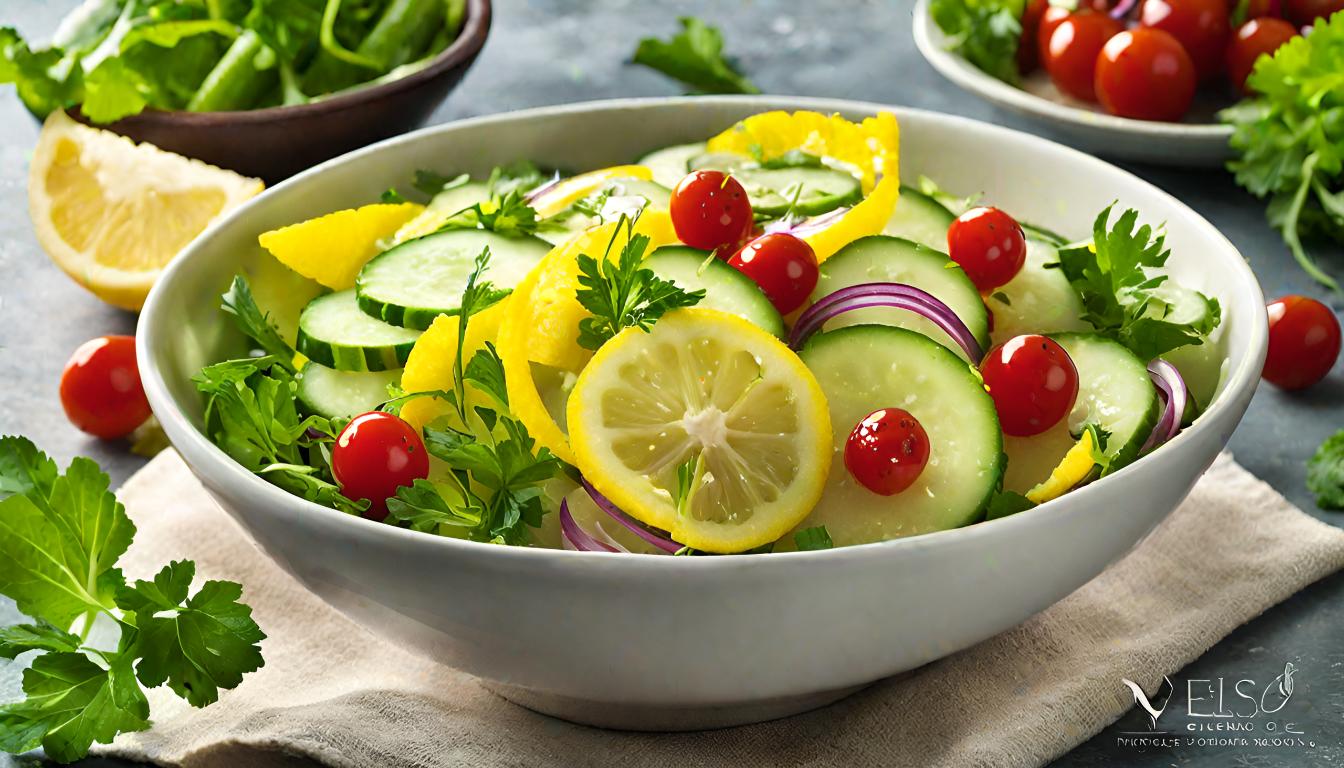captivating the hearts of gardeners and food enthusiasts alike. This comprehensive guide delves into the world of lemon cucumber, exploring everything from their intriguing origins to practical tips for growing and enjoying them in your daily diet. Whether you’re a seasoned gardener or a culinary explorer, this journey through the lemon cucumber’s versatility promises to be both enlightening and enjoyable.
Introduction to Lemon Cucumber
What is Lemon Cucumber?
Lemon cucumber, Cucumis sativus, stands out in the vegetable world. It’s not your typical green, elongated cucumber. Instead, imagine a small, round, yellow fruit resembling a lemon. But don’t let its looks deceive you! Despite its citrusy appearance, the lemon cucumber is all cucumber, with a sweet, mild flavor and a crisp texture that makes it a delightful addition to any salad or snack.
Origin and History
Tracing its roots back to the 19th century, the lemon cucumber is believed to have originated in India or the Middle East. It’s a heritage variety, meaning it’s been passed down through generations without significant modification. This little gem found its way into American gardens by the early 1900s, and since then, it’s been a cherished choice for those seeking something a bit different from the standard cucumber.
In the realm of cucumbers, the lemon variety is a true standout, offering not just a unique look but also a taste that’s hard to beat. Its journey from ancient gardens to modern plates is a testament to its enduring appeal. So, let’s roll up our sleeves and discover how to bring this delightful variety from the garden to your table.
In the next part, we’ll dive into the specifics of cultivating lemon cucumbers, ensuring your garden is a bountiful source of these yellow wonders. Stay tuned for practical tips and tricks that will turn your gardening efforts into a fruitful endeavor!
Cultivation Tips
Growing lemon cucumbers is not only a rewarding endeavor but also a delightful journey into the world of gardening. With the right conditions and care, you can enjoy a bountiful harvest of these refreshing fruits. Let’s dig into the essentials of cultivating lemon cucumbers, ensuring your garden becomes a vibrant source of this unique variety.
Choosing the Right Soil
Lemon cucumbers thrive in well-draining, fertile soil with a pH level between 6.0 and 6.8. Before planting, enrich your garden bed with plenty of organic compost to boost nutrient content and improve soil structure. This preparation ensures your lemon cucumbers have the best possible start.
Planting Seeds or Seedlings
Timing is crucial when planting lemon cucumbers. Wait until the danger of frost has passed and soil temperatures have warmed to at least 60°F (15°C). You can start seeds indoors about 2-3 weeks before the last expected frost to get a head start. When transplanting seedlings or sowing seeds directly into the garden, space them about 36 inches apart in rows, allowing ample room for growth and air circulation.
Watering and Care
Consistent moisture is key to growing lemon cucumbers, especially during flowering and fruit development. Aim for about 1 inch of water per week, adjusting as necessary during hot, dry periods. Mulching around the plants helps retain soil moisture and keeps weeds at bay. As your lemon cucumbers grow, support them with trellises or stakes to encourage vertical growth, which promotes air circulation and reduces disease risk.
Common Pests and Diseases
Like all cucumbers, lemon varieties are susceptible to pests such as cucumber beetles and diseases like powdery mildew. Regularly inspect your plants for signs of trouble and employ organic pest control methods when necessary. Crop rotation and proper sanitation, such as removing plant debris at the end of the season, are effective strategies for minimizing disease issues.
Related link : String Cheese
By following these cultivation tips, you’re well on your way to enjoying the fruits of your labor. Lemon cucumbers, with their distinctive taste and appearance, are sure to be a highlight in your garden and on your plate. In the next part of our guide, we’ll explore the nutritional benefits of lemon cucumbers, shedding light on why they’re not just a treat for the eyes but also a boon for your health.
Nutritional Benefits
Diving into the nutritional world of lemon cucumbers reveals a treasure trove of health benefits. These quirky-looking cucumbers are not just a visual delight but also pack a punch in terms of health and wellness. Let’s peel back the layers to uncover the nutritional benefits of incorporating lemon cucumbers into your diet.
Nutritional Profile
Lemon cucumbers are low in calories but high in essential vitamins and minerals. They’re an excellent source of Vitamin K, essential for blood clotting and bone health, and Vitamin C, a powerful antioxidant that supports immune function. Additionally, they contain potassium, which is vital for heart health, and molybdenum, a trace mineral that aids in the metabolism of fats and carbohydrates.
Hydration and Weight Loss
Boasting a high water content, lemon cucumbers are a perfect hydrator on hot summer days, helping to keep your body cool and hydrated. This high water content, combined with their fiber, makes them an ideal snack for those looking to manage their weight. The fiber helps you feel full longer, reducing the likelihood of overeating.
Skin Health
The combination of hydration, Vitamin C, and antioxidants in lemon cucumbers can also have a positive impact on your skin. Vitamin C is crucial for collagen production, which gives skin its elasticity and strength, while the high water content helps to keep your skin supple and hydrated. Antioxidants protect against damage from UV rays and pollution, contributing to a healthy, radiant complexion.
Incorporating lemon cucumbers into your diet is not just a way to add a splash of color and novelty to your meals; it’s also a step towards a healthier lifestyle. With their refreshing taste and multitude of health benefits, lemon cucumbers are a versatile addition to any diet. As we move forward, we’ll explore the culinary uses of lemon cucumbers, offering inspiration for how to make the most of this delightful vegetable in your cooking.
Culinary Uses
Lemon cucumbers, with their unique taste and texture, offer a refreshing twist to traditional cucumber dishes. Their versatility in the kitchen opens up a world of culinary possibilities, from simple salads to creative cocktails. Let’s explore how to incorporate lemon cucumbers into your diet, making your meals not only healthier but also more exciting.
Salad Recipes
The crisp, mild flavor of lemon cucumbers makes them a perfect addition to salads. Slice them thin and toss with a light vinaigrette, fresh herbs, and your favorite salad greens for a refreshing side dish. For a more substantial salad, combine lemon cucumber slices with quinoa, chickpeas, and a tangy lemon dressing, creating a protein-packed meal that’s both satisfying and nutritious.
Pickling and Preserving
Lemon cucumbers are excellent for pickling, offering a delightful twist to traditional pickled cucumbers. Their small size and tender skin allow them to absorb flavors well, making them a great candidate for both quick pickles and longer fermentation processes. Experiment with different spices and vinegars to create your own signature pickled lemon cucumbers, a tasty addition to sandwiches, charcuterie boards, or as a standalone snack.
Creative Uses in Drinks and Cocktails
Not just for eating, lemon cucumbers can also be a unique addition to drinks and cocktails. Muddle slices of lemon cucumber in a glass, add your favorite gin or vodka, a splash of tonic or soda water, and a hint of lime for a refreshing cucumber cocktail. For a non-alcoholic option, add lemon cucumber slices to a pitcher of water along with mint leaves and lemon slices for a hydrating and flavorful infused water.
The culinary potential of lemon cucumbers is limited only by your imagination. Their unique flavor and texture can enhance a wide range of dishes, adding a refreshing element to your culinary creations. As we continue our exploration of lemon cucumbers, we’ll next delve into the best practices for harvesting and storing these delightful fruits, ensuring you can enjoy their fresh taste long after the growing season has ended.
Related link : Mini Charlotte Desserts
Harvesting and Storage
Harvesting lemon cucumbers at the right time and storing them properly can significantly extend their freshness and flavor. Whether you’re a seasoned gardener or a first-time grower, understanding the nuances of when and how to harvest, as well as the best storage methods, is crucial. Let’s navigate through the steps to ensure your lemon cucumbers remain a crisp and tasty treat for as long as possible.
When and How to Harvest
Lemon cucumbers reach their peak ripeness when they are about the size of a small lemon, with a bright, light yellow color. It’s essential to monitor their growth closely, as they can quickly move past their prime if left on the vine too long. To harvest, gently twist the cucumber until it snaps off the vine, or use a pair of garden shears for a clean cut.
Harvesting early in the morning, when temperatures are cooler, can help preserve the crispness and flavor of the cucumbers. Regular harvesting also encourages the plant to produce more fruit throughout the season, maximizing your yield.
Storage Tips to Maximize Freshness
Once harvested, proper storage is key to maintaining the freshness of lemon cucumbers. Start by gently washing them under cool water to remove any dirt or debris. Dry them thoroughly with a clean cloth or paper towel to prevent moisture from causing premature spoilage.
For short-term storage, lemon cucumbers can be kept in the refrigerator’s crisper drawer for up to a week. Place them in a perforated plastic bag or wrap them in a paper towel to absorb any excess moisture, which can help prevent them from becoming soggy.
For longer storage, consider pickling or fermenting your lemon cucumbers. This not only extends their shelf life but also provides you with flavorful condiments that can enhance a variety of dishes.
Harvesting and storing lemon cucumbers correctly can greatly impact their quality and longevity. By following these tips, you can enjoy the fruits of your labor well beyond the growing season, savoring the unique taste and nutritional benefits of lemon cucumbers in your meals and snacks. Next, we’ll address some frequently asked questions about lemon cucumbers, providing you with even more insights into this fascinating variety.
FAQs about Lemon Cucumber
Lemon cucumbers spark curiosity and interest among many, leading to a variety of questions about their cultivation, nutritional benefits, and culinary uses. Here, we’ll address some of the most frequently asked questions about lemon cucumbers, providing you with a deeper understanding of this unique and versatile vegetable.
Can lemon cucumber be eaten skin-on?
Absolutely! One of the delightful aspects of lemon cucumbers is their thin, tender skin, which is entirely edible. Unlike some traditional cucumber varieties that may have a bitter or tough skin, lemon cucumbers offer a soft texture throughout. Eating them skin-on ensures you get the full range of nutrients and fiber.
How does lemon cucumber differ from regular cucumber?
Lemon cucumbers distinguish themselves from regular cucumbers in several ways. Firstly, their appearance is quite unique, resembling a lemon more than a cucumber due to their round shape and yellow color. Taste-wise, they are known for their sweet, mild flavor without the bitterness some cucumber varieties can have. Additionally, their skin is softer, and they contain a higher water content, making them exceptionally refreshing.
Tips for growing lemon cucumber in containers?
Growing lemon cucumbers in containers is a great option for those with limited garden space. Choose a large, deep container with ample drainage to accommodate the plant’s root system. Use a high-quality potting mix enriched with compost to ensure the soil is nutrient-rich and well-draining. Place the container in a location that receives at least 6 to 8 hours of sunlight daily. Regular watering is crucial, especially as the plant grows and temperatures rise. Consider using a trellis or stake to support the vines and promote vertical growth, which can help maximize space and improve air circulation around the plant.
Related link : Healthline – Cucumber Nutrition
Lemon cucumbers are a fascinating addition to any garden or kitchen, offering a unique twist on the traditional cucumber experience. With their refreshing taste, nutritional benefits, and versatility in culinary applications, it’s no wonder they’ve captured the interest of so many. As we wrap up our comprehensive guide, we’ll conclude with some final thoughts on embracing the versatility of lemon cucumbers.
Conclusion about Lemon Cucumber
Embracing the versatility of lemon cucumbers opens up a world of culinary exploration and gardening delight. From the sun-drenched gardens where they grow to the vibrant dishes they enhance, lemon cucumbers are a testament to the diversity and richness of nature’s bounty. As we conclude our comprehensive journey through the world of lemon cucumbers, let’s reflect on the key insights and inspirations we’ve gathered along the way.
Lemon cucumbers, with their distinctive appearance and refreshing taste, offer more than just a novel twist on the familiar. They embody the joy of gardening, the pleasure of cooking, and the importance of healthy eating. Whether you’re savoring them fresh from the vine, incorporating them into a myriad of dishes, or exploring their health benefits, lemon cucumbers are a delightful addition to your culinary repertoire and garden landscape.
As you embark on your own adventure with lemon cucumbers, remember the cultivation tips that can help you achieve a bountiful harvest, the nutritional benefits that make them a wise choice for your diet, and the endless culinary possibilities they present. Whether pickled, sliced into salads, or infused into refreshing beverages, lemon cucumbers are sure to bring a burst of flavor and joy to your table.
In the spirit of exploration and discovery, let lemon cucumbers inspire you to experiment, to learn, and to appreciate the simple pleasures that gardening and cooking can bring. Here’s to the lemon cucumber—a small but mighty symbol of the wonders that await in our own backyards and kitchens.






